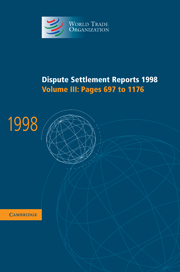Book contents
- Frontmatter
- Contents
- European Communities - Mesures Concerning Meat and Meat Products (Hormones), complaint by the United States (WT/DS26): Report of the Panel
- Argentina - Measures Affecting Imports of Footwear, Textiles, Apparel and Other Items (WT/DS56): Report of the Appellate Body
- Argentina - Measures Affecting Imports of Footwear, Textiles, Apparel and Other Items (WT/DS56): Report of the Panel
European Communities - Mesures Concerning Meat and Meat Products (Hormones), complaint by the United States (WT/DS26): Report of the Panel
Published online by Cambridge University Press: 22 December 2017
- Frontmatter
- Contents
- European Communities - Mesures Concerning Meat and Meat Products (Hormones), complaint by the United States (WT/DS26): Report of the Panel
- Argentina - Measures Affecting Imports of Footwear, Textiles, Apparel and Other Items (WT/DS56): Report of the Appellate Body
- Argentina - Measures Affecting Imports of Footwear, Textiles, Apparel and Other Items (WT/DS56): Report of the Panel
Summary
INTRODUCTION
On 26 January 1996, the United States requested consultations with the European Communities, pursuant to Article 4 of the Understanding on Rules and Procedures Governing the Settlement of Disputes (“DSU”), Article 11 of the Agreement on the Application of Sanitary and Phytosanitary Measures (“SPS Agreement”), Article 14 of the Agreement on Technical Barriers to Trade (“TBT Agreement”), Article 19 of the Agreement on Agriculture and Article XXII of the General Agreement on Tariffs and Trade 1994 (“GATT”), regarding the Council Directive Prohibiting the Use in Livestock Farming of Certain Substances Having a Hormonal Action and related measures (WT/DS26/1).
On 2 February 1997, pursuant to Article 4.11 of the DSU, Australia (WT/DS26/3) and New Zealand (WT/DS26/2), followed on 8 February by Canada (WT/DS26/4), requested to be joined in these consultations. The European Communities accepted these requests on 19 March 1996 (WT/DS26/5).
On 27 March 1996, the United States, Australia, Canada and New Zealand held joint consultations with the European Communities but failed to reach a mutually satisfactory solution.
On 25 April 1996, pursuant to Article 11 of the SPS Agreement, Article 14 of the TBT Agreement, Article 19 of the Agreement on Agriculture, Article XXIII:2 of the GATT, and Article 6 of the DSU, the United States requested the Dispute Settlement Body (“DSB”) to establish a panel with standard terms of reference (WT/DS/26/6). The United States claimed that the EC measures:
”… adversely affect imports of meat and meat products and appear to be inconsistent with the obligations of the European Communities under the General Agreement on Tariffs and Trade 1994, the Agreement on the Application of Sanitary and Phytosanitary Measures, the Agreement on Technical Barriers to Trade, and the Agreement on Agriculture. The provisions of these agreements with which these measures appear to be inconsistent include, but are not limited to, the following:
(1) General Agreement on Tariffs and Trade 1994, Article III or Article XI;
(2) Agreement on the Application of Sanitary and Phytosanitary Measures, Articles 2, 3 and 5;
- Type
- Chapter
- Information
- Dispute Settlement Reports 1998 , pp. 699 - 1002Publisher: Cambridge University PressPrint publication year: 2000
- 1
- Cited by



